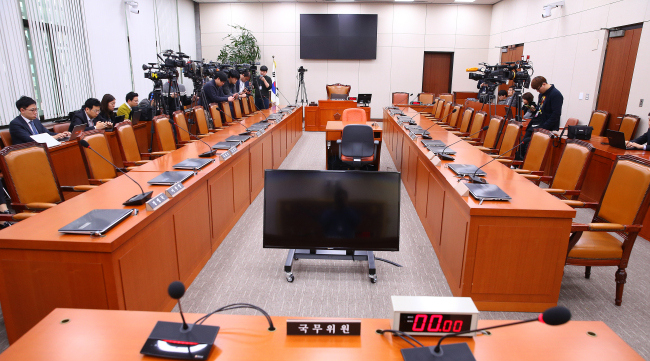While inter-Korean relations stiffened rapidly over the closure of the Gaeseong industrial park, political parties here continued to lock horns over the South Korean government’s hard-line policy towards the North and its measures to support the expelled businesses.
The ruling conservative party claimed the shutdown decision was justified, spotlighting the communist neighbor’s earlier nuclear and missile tests against warnings from the international community.
 |
| The National Assembly’s Foreign Affairs and Unification Committee is suspended after ruling party members and relevant government officials did not attend the meeting called by the opposition party to discuss inter-Korean tensions and Gaeseong industrial park suspension Friday. Officials said the meeting will be called again Monday. (Yonhap) |
The opposition camp, on the other hand, reproached it as an unnecessary provocation. Some radical members went as far as to suggest the government and ruling camp may be taking advantage of the North Korean factor to kindle security issues ahead of the April general elections.
“The total closure of the Gaeseong complex was an inevitable decision for the government to take under the circumstances,” the ruling Saenuri Party’s chief spokesperson Rep. Kim Young-woo said Friday in a statement.
He also blamed opposition The Minjoo Party of Korea for belittling the industrial park closure as an election strategy.
“The Korean Peninsula is currently in an emergency situation, so this really is no time to play political games,” Kim said. It is typically considered to be in the favor of the conservative party in power when a national security threat takes place before a key election.
The ruling party also stressed that the recent military provocations from the North added to the legitimacy of the pending terrorism prevention bill.
“If a terrorist attack were to take place right now, who would then be held responsible?” posed party leader Rep. Kim Moo-sung during a meeting on immigration safety held at the Incheon International Airport.
“The opposition party may but face the blame that it neglected the security of the people and the nation, should it keep countering the bill for no reason.”
The Minjoo Party, however, underlined the fact that the government’s strong responses snapped the feeble inter-Korean ties.
“I am worried that the peninsular trust-building process may now turn into a hate-building one,” said Minjoo Party floor leader Rep. Lee Jong-kul. The trust-building process is a policy baseline that President Park Geun-hye has been repeating over the years in promise to improve the tens relations with the North in conjunction with its denuclearization.
“We would have accepted the closure, although with a heavy heart, had there been serious threats to national security or sufficient bridging measures in between,” Lee claimed.
“But the government has never suggested detailed evidence to back its claim that the North Korean regime was appropriating the park’s profits for the sake of its weaponry development.”
Rep. Ahn Cheol-soo, cohead of the new centrist People’s Party, remained at a step back from the bipartisan conflict, focusing on compensation for the expelled companies.
While parties stood at odds over the closure, the company representatives called for compensatory actions.
“We demand for the establishment of a damage investigation committee, consisting of the ruling Saenuri Party, or at least the three opposition parties,” said Jeong Ki-seop, association chairman of the group of Gaeseong industrial park businesses.
The Office for Government Policy Coordination had earlier announced a series of compensation measures, including the postponement of loan redemptions for the affected companies.
“The state should have protected the lives and assets of its people in the first place,” Jeong said, after the government announcement.
“Redeeming taxes or lending money is no fundamental solution.”
By Bae Hyun-jung (tellme@heraldcorp.com)

